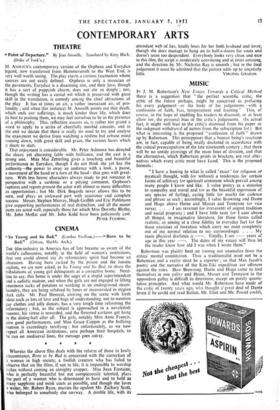CONTEMPORARY ARTS
THEATRE
44 Point or Departure." By Jean Anouilli. Translated by Kitty Black. (Duke of York's.) M. ANoulurs contemporary version of the Orpheus and Eurydice legend, now transferred from Hammersmith to the West End, is very well worth seeing. The play exerts a curious fascination whose sources are not easily defined. Orpheus is only a musician of the pavements, Eurydice is a disarming slut, and their love, though it has a sort of puppyish charm, does not stir us deeply ; nor, though the writing has a casual wit which is preserved with great skill in the translation, is comedy among the chief attractions of the play. It has at times an air, a rather insouciant air, of pro- fundity ; and when (for instance) M. Anouilh points out that death, which ends our sufferings, is much kinder than life, which does its best to prolong them, we may feel ourselves to be in the presence of a philosophy. This, reflection assures us, is rather too grand a word to apply to a series of cheerfully morbid conceits, and in the end we decide that there is really no need to try and analyse the enjoyment we derive from watching a restless but urbane mind running down, with great skill and grace, the various hares which it elects to start.
That enjoyment is considerable. Mr. Peter Ashmore has directed the sleazy yet charming fable with brilliance, and the cast is a strong one. Miss Mai Zetterling gives a touching and beautiful performance as Eurydice, though 1 do not think she yet has the authority—the power to sway an audience with a look, a pause, a movement of the hand or a turn of the head—that goes with great- ness. With less heroic characters always ready to put romance in perspective with a sardonic or a pitying comment, Orpheus's raptures and regrets present the actor with almost as many difficulties as opportunities ; but Mr. Dirk Bogarde never allows this to be seen, and plays an awkward part with assurance and complete success. Messrs. Stephen Murray, Hugh Griffith and Eric Pohlmann give supporting performances of real distinction. and all the minor parts are acted well, especially those for which Miss Dorothy Blythe, Mr. John Moffat and Mr. John Kidd have been judiciously cast.
PETER FLEMING.






































 Previous page
Previous page